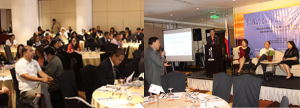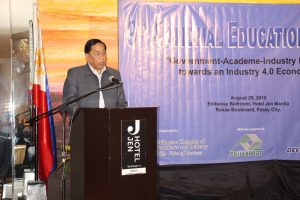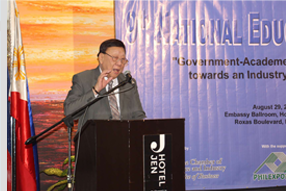The ATA Carnet system is an international scheme that will allow temporary admission and tax-free and duty-free importation of commercial samples, professional equipment and articles for presentation or use in trade fairs, shows, and exhibitions without customs formalities.
The system will also allow traders to use ATA Carnet secured by an international guarantee system. The ATA Carnet is a single document of goods that will pass through several customs territories and will be valid up to one (1) year. It will foster free movement of goods between countries, thus saving costs and time in clearing goods at the border. Failure to re-export all goods listed on the Carnet will result in the payment of applicable duties.
The Department of Finance (DOF), in a letter to the Department of Foreign Affairs (DFA) dated 8 August 2019, requested the preparation of the Instrument of Accession subject to certain conditions. It also underscored that the Convention will “help promote efficiency, consistent with the Administration’s policy of promoting ease of doing business and efficient service delivery.”
Relevant government agencies such as the Department of Trade and Industry (DTI), Bureau of Customs (BOC), Bureau of Internal Revenue (BIR), Department of Tourism (DOT) and Tariff Commission signified their support by submitting their respective Certificates of Concurrence (COC) to the DFA through the DOF.
Once signed by the President, Senate ratification through the concurrence of at least two-thirds of its members is constitutionally required. The Convention provides that it shall enter into force three months after the Philippine has deposited its Instrument of Accession.
The implementation of the ATA Carnet system will support the Office of the President Memorandum Circular (MC) No. 27 which directs “all concerned agencies to strengthen the implementation of the Philippine Export Development Plan and involving other agencies in the development of the export sector”. Specifically, MC 27 mandates the DFA to advocate the Philippine Accession to the Istanbul Convention.- ARB

 The Export Development Council (EDC) in partnership with the Tourism Infrastructure and Enterprise Zone Authority (TIEZA) continuously supports Philippine Exporters by giving travel tax exemption incentives through Executive Order (EO) 589 for the past 12 years.
The Export Development Council (EDC) in partnership with the Tourism Infrastructure and Enterprise Zone Authority (TIEZA) continuously supports Philippine Exporters by giving travel tax exemption incentives through Executive Order (EO) 589 for the past 12 years.
 The 9th National Education Forum (NEF) was held last 29 August 2019 at Hotel Jen, Pasay City. Attended by distinguished speakers and panelists from the government, academe, and industry, the forum discussed the impact of the Fourth Industrial Revolution (4IR) in business, work and our daily lives as well as offer solutions and insights on how to go about meeting the challenges imposed by this technological transformation.
The 9th National Education Forum (NEF) was held last 29 August 2019 at Hotel Jen, Pasay City. Attended by distinguished speakers and panelists from the government, academe, and industry, the forum discussed the impact of the Fourth Industrial Revolution (4IR) in business, work and our daily lives as well as offer solutions and insights on how to go about meeting the challenges imposed by this technological transformation. The speakers and panelists alike discussed the pros and cons of the 4IR. Ms. Riza Mantaring of the Management Association of the Philippines (MAP) discussed the wonders of the hologram technology- an image that appears to be three dimensional and can be seen with a naked eye. As an advanced technology, holograms can also perform operations and surgeries outside operating rooms in any country.
The speakers and panelists alike discussed the pros and cons of the 4IR. Ms. Riza Mantaring of the Management Association of the Philippines (MAP) discussed the wonders of the hologram technology- an image that appears to be three dimensional and can be seen with a naked eye. As an advanced technology, holograms can also perform operations and surgeries outside operating rooms in any country. ont of them. Relations will lose value as most of us now have become busy on our social media life and there is now the prevalence of fake news, voice and facial reorganization, etc, which are regarded as ethical concerns. Further, there are risks of machines overpowering humans as portrayed in movies such as Terminator and I Robot.”
ont of them. Relations will lose value as most of us now have become busy on our social media life and there is now the prevalence of fake news, voice and facial reorganization, etc, which are regarded as ethical concerns. Further, there are risks of machines overpowering humans as portrayed in movies such as Terminator and I Robot.” PHILEXPORT President, Mr. Ortiz-Luis, emphasized the importance of “government officials, educational institutions, business leaders, and policymakers in pushing forward advocacies on education such as 4.0 workforce readiness, strengthening government-academe-industry linkages as well as best practices on multi-skilling workforce and plotting the ways forward in future-proofing work in the Philippines.”
PHILEXPORT President, Mr. Ortiz-Luis, emphasized the importance of “government officials, educational institutions, business leaders, and policymakers in pushing forward advocacies on education such as 4.0 workforce readiness, strengthening government-academe-industry linkages as well as best practices on multi-skilling workforce and plotting the ways forward in future-proofing work in the Philippines.” Commerce and Industry (PCCI), the Export Development Council (EDC), PHILEXPORT and the Employers Confederation of the Philippines (ECOP) are all working on policies towards identifying the breadth of jobs that are likely to be threatened by this technological advancement. Noting for example is the rapid progress in Artificial Intelligence (AI), which indicates a much broader range of jobs than previously thought could be carried out by machines. Therefore, the Commission on Higher Education and other government agencies shall make sure that essential policies shall bring up symmetrical balance so that we will not be worried about automation affecting employment in the country.”
Commerce and Industry (PCCI), the Export Development Council (EDC), PHILEXPORT and the Employers Confederation of the Philippines (ECOP) are all working on policies towards identifying the breadth of jobs that are likely to be threatened by this technological advancement. Noting for example is the rapid progress in Artificial Intelligence (AI), which indicates a much broader range of jobs than previously thought could be carried out by machines. Therefore, the Commission on Higher Education and other government agencies shall make sure that essential policies shall bring up symmetrical balance so that we will not be worried about automation affecting employment in the country.”